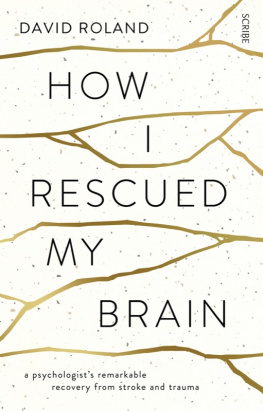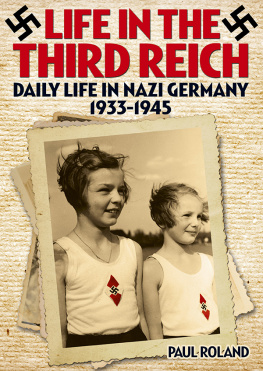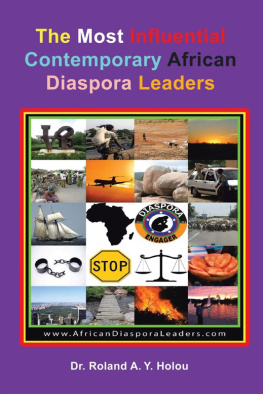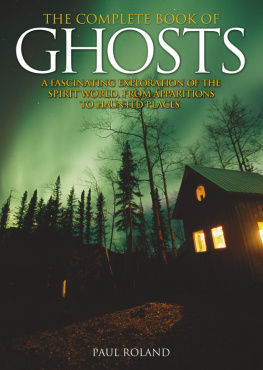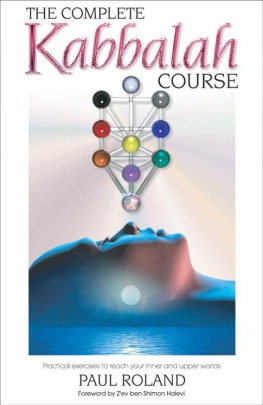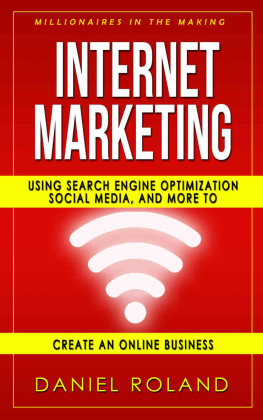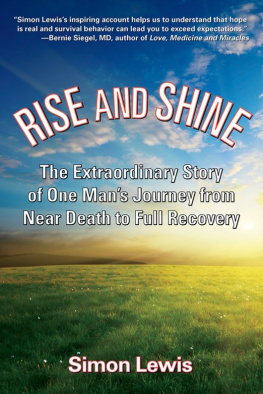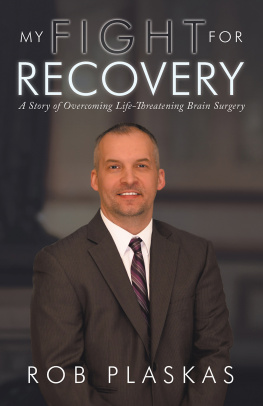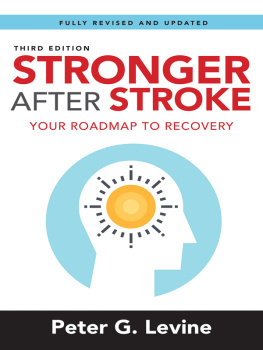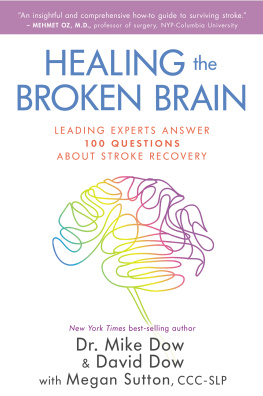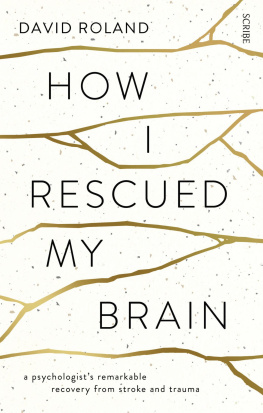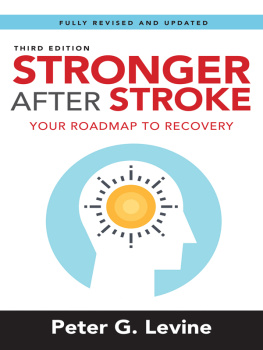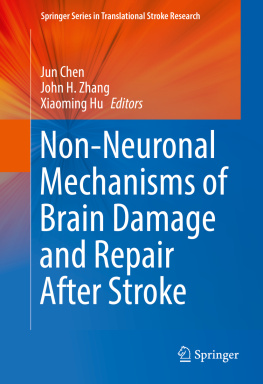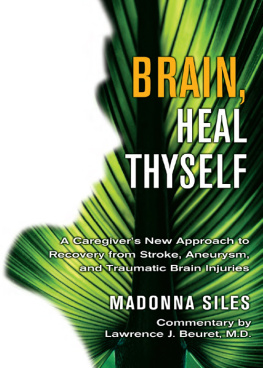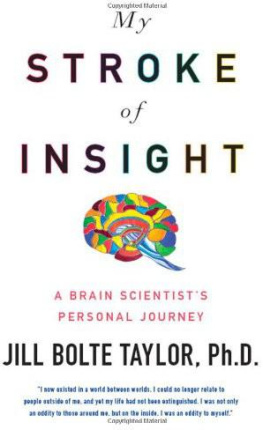
Scribe Publications
HOW I RESCUED MY BRAIN
David Roland has a PhD in clinical psychology, and has trained in neuropsychological assessment and studied interpersonal neurobiology online with professor Daniel Siegel (author of Mindsight ). David is an honorary associate with the School of Medicine at the University of Sydney, a member of the Australian Psychological Society, and a founder of the Australian branch of the Compassionate Mind Foundation. His first book was The Confident Performer (1998).
Scribe Publications Pty Ltd
1820 Edward St, Brunswick, Victoria 3065, Australia
50A Kingsway Place, Sans Walk, London, EC1R 0LU, United Kingdom
First published by Scribe 2014
Copyright David Roland 2014
All rights reserved. Without limiting the rights under copyright reserved above, no part of this publication may be reproduced, stored in or introduced into a retrieval system, or transmitted, in any form or by any means (electronic, mechanical, photocopying, recording or otherwise) without the prior written permission of the publishers of this book.
While every care has been taken to trace and acknowledge copyright, we tender apologies for any accidental infringement where copyright has proved untraceable and we welcome information that would redress the situation.
National Library of Australia
Cataloguing-in-Publication data
Roland, David, author.
How I Rescued My Brain: a psychologists remarkable recovery from stroke and trauma / David Roland.
9781925106008 (Australian edition)
9781922247421 (UK edition)
9781925113044 (e-book)
1. Roland, David. 2. Cerebrovascular diseasePatientsBiography. 3. Cerebrovascular diseasePatientsRehabilitation. 4. BrainWounds and injuriesPatientsBiography. 5. BrainWounds and injuriesPatientsRehabilitation.
362.196810092
scribepublications.com.au
scribepublications.co.uk
To Edward George Roland:
World War II pilot, telephone technician, environmental activist,
and my father.
AUTHORS NOTE
IN WRITING THIS memoir, I have relied upon personal journals, medical records, and my recollections. I have consulted with most of the individuals in the story to check factual details, where these can be verified. In some cases, the individuals have helped me to re-create events and dialogue. Yet, ultimately, this is my version of the story and true to my emotional experience. Others may have different experiences of events that we shared.
I have changed many of the names and identifying details to preserve anonymity. In some cases, where individuals have agreed, I have retained real names and details.
I have not created composite characters or events. In a few instances, I have compressed time for the ease of storytelling. I have omitted events that do not relate directly to the themes in this book, and because it is impossible to include everything that happened over the six years that the memoir covers.
PROLOGUE
IM HAVING TROUBLE working out where I am.
Somehow, this isnt perturbing, simply puzzling. Im in a puzzle and need to put together the clues to work out what this is all about.
Im sitting in the centre of a row of beige plastic chairs. When I turn my head, I realise that my wife, Anna, is next to me. A ring of beige chairs also lines the walls. Other people, scattered around the room, are flicking through magazines or looking down and shuffling their feet. I get the feeling that they dont want to be here.
A beeping sound is coming from somewhere. To my right, people are moving through an automatic door, which shudders as it opens. I look up to see a woman behind a counter and a glass window. She seems harassed, and her dark hair hasnt been brushed recently. Shes on the phone and taking notes. Every so often, people go up to the opening in the window and talk to her. She frowns when they approach, as though she doesnt really want to speak with them.
Now Anna goes up and talks to her too.
We seem to be in some sort of waiting room, but I dont know why.
I look around. There are posters on the walls, with bold letters reading, Cover Your Cough, For Infection Control Reasons, Wash Your Hands, and other things. Lots of the posters have people on them looking pleased or sad.
The sunlight slanting through the windows on the far wall is soft; it must be morning light.
In one corner of the room, on a low table, there are piles of magazines. I walk over to pick up Country Life and then sit down again. Theres a section on real estate, with pictures of quaint, homely-looking cottages; some have picket fences. Other photographs show mansions, built of sandstone or solid-looking bricks. The descriptions beneath list each propertys features, telling of the life of contentment that can be enjoyed if one makes the place their new home.
Theres one I like: a cute cottage with a garden for $350,000. Is that a lot of money? I used to know. When I look at the date on the cover, 2007, I realise that I dont know what year it is now. The magazine must be old: its pages are curled and creased. The names of the country towns in the ads seem familiar, but when I try to picture where they are, I cant; my sense of geography is wavy. Goulburn , I say to myself. Nothing. Cooma . Still nothing. The names swim around in my mind, sounds without any pictures attached to them.
Off to my left, a child is whining. I turn to see a man and a woman, both big, with a girl aged four or five. They look tired, as parents do when theyve been up during the night with a grumpy child. Soon I am absorbed by their interactions; its like watching a show. The father lifts the girl onto his lap, looking strained. The mother holds up a childrens book, reading to her as a kindergarten teacher would. The child listens for a while, fidgets, and cries again. The mother tries to interest her in one of the toys from a box in the corner, but it doesnt work. I know what this is like; Im a parent too. Theyre doing their best.
How did I get to this room? A fragment comes into my mind a dreamlike image of Anna driving us in the white Tarago and me vomiting out of the car window. Did this really happen, or am I imagining it?
I turn to Anna and see that shes crying quietly: her cheeks are pink; the rims of her eyes are red. Shes sad about something, but I dont know what. I put my arm around her shoulder and pat her gently. Itll be all right, I say. She quiets a little. After a while I take my arm back and return to Country Life .
As we sit there, I feel as if Im in a sound bubble, into which the surrounding noises dont intrude. The crying girl doesnt irritate me as I think she might have at another time. Instead I feel a well of stillness inside. I keep turning the pages.
PEOPLE COME IN and out of the room, as though it becomes more and then less popular. Then a man in white appears, like a jack-in-the-box, out of a doorway. He calls out my name and holds the door ajar. It has an important-looking sign on it: CLINICAL INITIATIVES NURSE .
Anna and I get up and follow him in.
The room is small and square-shaped with clean, shiny equipment. The lights are very bright. The man has a sense of enthusiasm and energy about him; he looks interested in me. We sit down opposite each other, knee-to-knee. He brings his face, with intense, smiling eyes, close to mine. He looks clean, as though recently showered and shaved. I like his energy.
Now, David, he says. Can you tell me what day of the week it is?
His expression is encouraging, like a teachers. He knows the answer, but its important to him that I say it. I want to help, so I think hard.
Its Wednesday or it could be Thursday. I remember I was meant to do something special with the kids today, but I dont know what that was.
Next page
